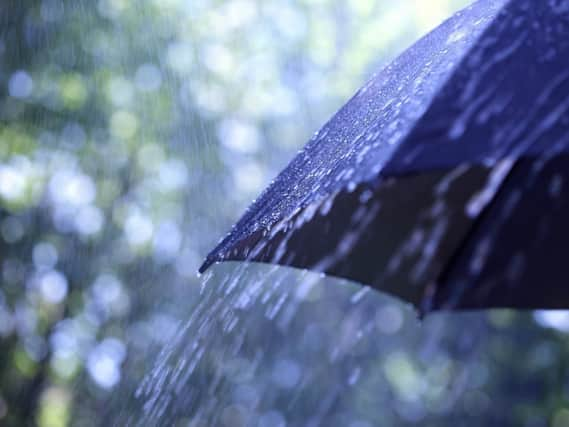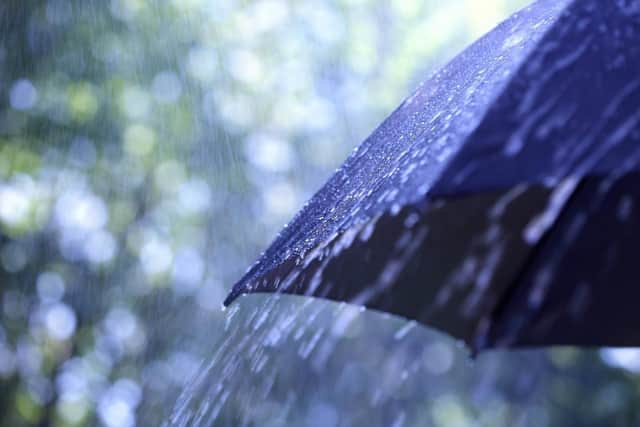Leeds most common weather phrases revealed: Which do you use?


'It's nippy' is the most used weather phrase in Leeds, data collected by the British Science Association has shown.
Advertisement
Hide AdAdvertisement
Hide Ad34 per cent of the people from Leeds asked in the study said they would use the phrase to describe weather.


This followed a national trend, with 'it's nippy' being the most used term in the country followed by ‘it’s tipping it down’ (26 per cent), and ‘it’s blowing a gale’ (24 percent).
However, the poll of 2,000 people found stark differences between UK regions in terms of the language we use to describe the weather.
In Leeds the next most popular phrases were 'it's tipping it down' (24 per cent), 'it's blowing a gale' (29 per cent) and 'it's raining cats and dogs' (30 per cent).
Advertisement
Hide AdAdvertisement
Hide AdUnusually that makes us more similar to our southern friends than we might think as southerners are twice as likely to say 'it's tipping it down' than in the North, where the preferred phrase is usually 'it's lashing it down, the survey revealed.
The British Science Association has partnered with Operation Weather Rescue to tap into our passion for the weather with a citizen science project that will help scientists predict and prepare our future climate.
With Storm Gareth bringing up to 70mph winds and travel disruption, flash flood this weekend and Storm Hannah threatening snow next week, it may come as no surprise that our most common weather phrases are all connected to the rain, wind, and cold.
The UK's top weather phrases are:
It’s nippy – most commonly used in Brighton
It’s tipping it down - most commonly used in Plymouth
It’s blowing a gale - most commonly used in Brighton
Raining cats and dogs - most commonly used in Nottingham
The Heavens have opened - most commonly used in Brighton
Indian Summer - most commonly used in Brighton
It's lashing it down - most commonly used in Liverpool
It’s pelting it down - most commonly used in Glasgow
Brass Monkeys - most commonly used in Edinburgh
It’s Baltic - most commonly used in Glasgow
Advertisement
Hide AdAdvertisement
Hide AdThis British Science Week, the British Science Association has been harnessing the energy of weather enthusiasts to help digitise weather records.
One of the biggest challenges that researchers face is access to old data sets – there are millions of pages of data are held in archives but computers struggle to read the handwriting.
People across the country have been helping to input data from hand-written weather records from the 1860s-1880s as part of Operation Weather Rescue.
By understanding the patterns in this historic weather, scientists can build a more accurate picture and look at implications for climate change today.
Advertisement
Hide AdAdvertisement
Hide AdTo date, over 250,000 tasks have been undertaken saving scientific researchers an estimated two years’ worth of effort.
Katherine Mathieson, Chief Executive, British Science Association says: “It’s brilliant to see over 250,000 tasks have been undertaken so far but we want to see more people get involved with Operation Weather Rescue.
The great thing about citizen science is almost anyone can take part from the comfort of their own home. Whether you have only five minutes or a few hours – every contribution will help power new discoveries in climate science!”
Professor Ed Hawkins, Professor of Climate Science at the University of Reading and NCAS, who is the project lead for Operation Weather Rescue, says: “Looking at weather in the past, from these very first weather forecasts, can help climate scientists to better understand our climate and make predictions about the future.
Advertisement
Hide AdAdvertisement
Hide AdExtreme weather events from history can guide us to make important decisions that can help protect us from extreme weather in the future, for example, how big do our flood defences need to be.”
Let us know which phrases you use to describe the weird and wild weather we've been experiencing recently.